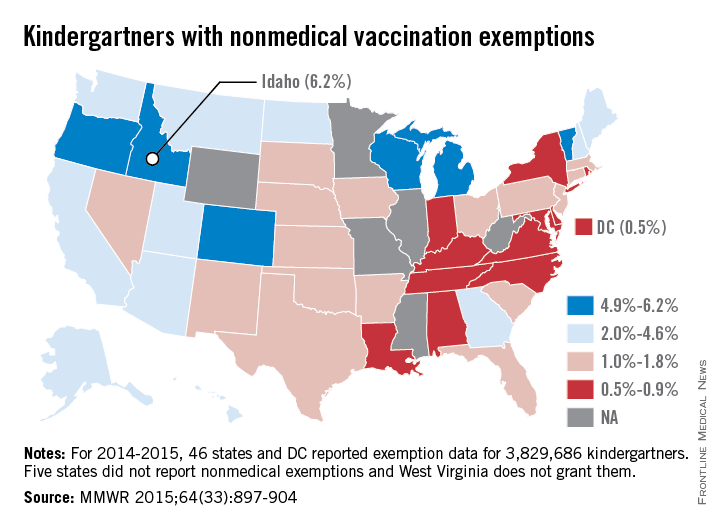Idaho had the highest percentage of current kindergartners who received nonmedical vaccination exemptions, the Centers for Disease Control and Prevention reported.
For the 2014-2015 school year, 6.2% of the state’s kindergartners received nonmedical exemptions: 137 were religious and 1,295 were philosophic. Vermont had the second-highest exemption rate at 5.9%, almost all of which were philosophic. Oregon was third at 5.8%, but the state does not report religious and philosophic exemptions separately, the CDC said (MMWR 2015;64[33]:897-904).
The lowest rate for 2014-2015 was in the District of Columbia, where just 0.5% of kindergartners had nonmedical exemptions for vaccination. The District of Columbia, along with 29 states, does not allow philosophic exemptions The state with the lowest rate was Louisiana at 0.6%, most of them philosophic, with three states tied at 0.7%: Alabama, Kentucky, and New York. None of those three states allows philosophic exemptions, according to the CDC.
Of the 15 states that reported philosophic exemptions, Louisiana had the lowest rate at 0.5% of all kindergartners and Vermont had the highest rate at 5.8%. Of the 41 states that reported religious exemptions, Utah was the lowest with a rate of 0.03% of all kindergartners and Alaska was the highest with a rate of 4.5%, the CDC data show.
Altogether, 46 states and D.C. reported nonmedical exemption data for 3,829,686 current kindergartners. Five states did not report nonmedical exemptions and West Virginia does not grant them. As of the 2016-2017 school year, California will remove both religious and philosophical exemptions and Vermont will remove philosophic exemptions, the CDC noted.


